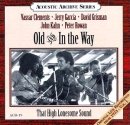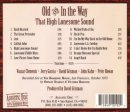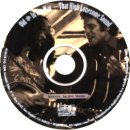That High Lonesome SoundOld & In The WayInitial release : 1996Acoustic Disc ACD 19
Acoustic Archive Series
Original Live Recordings From 1973 - Vol. 1
The first of two archive releases of live Old And In The Way recorded in 1973.
Tracks
- Hard Hearted (Jim McReynolds / Jesse McReynolds)
- Great Pretender (Buck Ram)
- Lost (Buzz Busby / Cindy Davis)
- Catfish John (Bob McDill/ Allen Reynolds)
- That High Lonesome Sound (Peter Rowan)
- Lonesome Fiddle Blues (Vassar Clements)
- Love Please Come Home (Leon Jackson)
- Wicked Path of Sin (Bill Monroe)
- Uncle Pen (Bill Monroe)
- I'm on My Way Back to the Old Home (Bill Monroe)
- Lonesome L.A. Cowboy (Peter Rowan)
- I Ain't Broke (But I'm Badly Bent) (H. Payne)
- Orange Blossom Special (Ervin Rouse)
- Angel Band (W.B. Bradbury/ Jefferson Hascall)
Musicians
- Jerry Garcia - banjo, vocals
- David Grisman - mandolin, vocals
- Peter Rowan - guitar, vocals
- Vassar Clements - fiddle, vocals
- John Kahn - acoustic bass
Credits
- Recorded live at the Boarding House, San Francisco in October 1973
- Recording engineers - Owsley Stanley and Victoria Babcock
- Producer - David Grisman
- Production Coordinator - Craig Miller
- Mastering - Paul Stubblebine
- Liner Notes, Photography - Neil V. Rosenberg
- Liner notes - Richard Loren
- Design & layout- D. Brent Hauseman
- Photography - Nobuharu Komoriya, Susana Millman, Sheldan Collins
- Liner notes - Owsley Stanley
Notes
Our thanks go to Neil V. Rosenberg and Acoustic Discs who have given permission to reprint Neil's song notes from the That High Lonesome Sound CD booklet.
- Hard Hearted was composed by Jim and Jesse McReynolds, who recorded it in Jacksonville, Florida for Starday Records in the fall of 1958 with their Virginia Boys, a band that included Vassar. Old And In The Way's version features the lead singing of Peter Rowan; on the trio choruses he moves to the high tenor harmony part, Grisman takes the melody, and Garcia sings the baritone part beneath the lead. The band doubles the break to let Vassar's amazing fiddle take a turn every time. Jerry's banjo break shows his mastery of the then new chromatic or melodic style that Bill Keith pioneered.
- The Great Pretender. The Platters' Buck Ram penned this rock and roll classic as a follow-up to his Only You. It hit Billboard's Top 10 in January, 1956, made #1 in February, and stayed in the charts for four months. Old And In The Way's arrangement is a statement on the band's bluegrass-rock connections. The mid-song tempo change recalls Bill Monroe's remake of his own Blue Moon Of Kentucky, originally a waltz, which he recut with a similar tempo shift to cover Elvis's hit version. They sing it as a classic bluegrass trio with Peter singing lead, David doing a tenor part above him, and Jerry taking the baritone part below.
- Lost. Louisiana born mandolinist Buzz Busby heated up bluegrass around the Washington D. C. area in the early 1950s. In 1955 he recorded this bluegrass honky-tonk classic with a hot band that included bluegrass greats Scotty Stoneman on fiddle, Don Stover on banjo and Charlie Waller on guitar. It was released as a single for the obscure Jiffy label and later reissued on a Rebel mail order special album. Old And In The Way's arrangement resembles Busby's but adds a vocal trio and fiery instrumental breaks in the spirit of the original. John Kahn really cooks on the bass here, too.
- Catfish John. Written by Bob McDill and Alan Reynolds, this was a hit for country singer Johnny Russell in late 1972 and early 1973. Bluegrass singers took to it - the Country gentlemen, one of the most popular bands at the time, included it on their first Vanguard album that year, for example. Jerry sings lead on this one, and his banjo backup work behind his own vocals can be heard clearly. On the choruses Peter songs tenor above him, and Vassar adds a high baritone part above that - a trio style often associated with the Stanley Brothers.
- That High Lonesome Sound. Peter Rowan's song about bluegrass festivals is one he still performs today. He included it on New Moon Rising, his 1988 album with the Nashville Bluegrass Band. On the third verse Vassar Clements responds brilliantly to the request to "plays us a little jam," and Peter recalls a story Bill Monroe had told him about his Uncle Pendelton Vandiver - "Uncle Pen" - playing fiddle on the back of a mule. At the end of the song Vassar closes with a quote from Monroe's song about his uncle. David and Jerry join in on the chorus in a vocal trio similar to that on the previous cut.
- Lonesome Fiddle Blues. Vassar first recorded this original composition in 1971 with the Nitty Gritty Dirt Band on the Will The Circle Be Unbroken album. It quickly became a bluegrass favorite; Sam Bush played it on the Newgrass Revivals first album, for Starday, in 1972. It showcases Vassar's distinctive stylings - the slides, the ascending four-note phrases, the syncopated chords, and more - and also gives Jerry and David an opportunity to cut loose on the banjo and mandolin solos.
- Love Please Come Home. Leon Jackson's classic from an obscure King single in the late 1950s was a bluegrass hit for Don Reno and Red Smiley, also on a King single as well as an album in 1961. It's catchy 1-7-4 chord changes at the end of the first line, which built on popular traditional Appalachian tunes and songs with similar changes like Paddy On The Tunpike and Little Maggie, helped make it a popular song at bluegrass jams. It's been recorded by many bands, including Bill Monroe's. Peter sings lead on the verses, then takes the high tenor on the chorus while Jerry sings the lead and David provides the baritone part.
- Wicked Path Of Sin. Bill Monroe's Blue Grass Quartet recorded this self penned hymn in September, 1946. Old And In The Way put together a vocal quartet for their version that follows Monroe's arrangement pretty closely, with Peter on lead, David on tenor, Jerry on baritone, and Vassar singing bass. David's mandolin breaks preserve the spirit of Monroe's mandolin breaks on gospel songs - short and hot.
- Uncle Pen. Bill Monroe's classic reminiscence about his fiddling uncle, first recorded in 1950, remains one of his most popular numbers; Ricky Skaggs had a hit with it in the 1980s. You can pretty much count on hearing it at a Monroe show, so for a band like Old And In The Way, with two former Blue Grass Boys on fiddle and guitar, this one is a natural. Their version opens with Peter playing the guitar run that's pivotal in the arrangement (coming right after the "you could hear it talk, you could hear it sing" a cappella section in the chorus), and Vassar somehow manages to stick to the frame of onroe's original fiddle arrangement while adding all sorts of new ideas - a real tour de force. The trio on the chorus is arranged like those of the The Great Pretender and High Lonesome Sound.
- I'm On My Way Back To The Old Home. In february, 1950, Vassar played on the original recording of this song Bill Monroe wrote about his home outside Rosine, Kentucky. David takes the lead, Peter adds tenor and Jerry sings baritone in the vocal trio on the chorus.
- Lonesome L.A. Cowboy. Peter Rowan's song about the L.A. scene of the early 1970s is done here in a trio that puts his lead vocals on top of the harmony parts by David (baritone) and Jerry (low tenor, below the baritone) - a trio structure introduced into bluegrass music by the Osborne Brothers and Red Allen.
- I Ain't Broke But I'm Badly Bent. This is one that Edd Mayfield, who was Bill Monroe's guitarist and lead singer, sang at a show at the Brown County Jamboree, where he introduced it as "one of Red Taylor's numbers" (Taylor had been a fiddler with Monroe. That Spetember 4, 1954 performance was recorded by Marvin Hedrick, a local bluegrass fan and old-time musician who used the the-new recorder technology to tape bluegrass shows and radio broadcast. Copies of this tape (and this song) went into underground circulation in the early 1960s after Jerry, Sandy and I had made copies of it. When David recorded his first album in 1975, he taught the tune to Ricky Skaggs, who sang it on the session and later on one of his own albums. Here Peter sings the lead, and David adds a tenor harmony on the last lines.
- Orange Blossom Special. The Rouse Brothers of Florida are credited as composers of this most popular of all programatic fiddle-train songs. In recent years Chubby Wise, Vassar's predecessor in the Blue Grass Boys, has admitted to taking a key role in it's composition. Though the Rouses recorded it in 1939, it was Bill Monroe's 1941 Victor recording that set it on the road to popularity. The Stanley Brothers' 1955 recording, included on their first Mercury album, reintroduced it to younger bluegrass fans in the late 1950s and early 1960s. Many others have recorded it since then. This version has some great interplay between the instruments during the space before the final stanza - mandolin and fiddle, then fiddle and banjo, call and respond to each other; David raps on his mandolin, and Vassar throws in one of his favorite musical quotes, a few notes from the Dragnet theme.
- Angel Band. Now a well-known piece in southern gospel tradition, this song is attributed to Jefferson Hascall and W. B. Bradbury in R. E. Winsett's 1948 gospel songster Heavenly Sunlight. According to Charles K. Wolfe, Bradbury was a New York publisher and songwriter who seems to have flourished about the time of the Civil War. Like his other hit, Jesus Loves Me, Angel Band is of 1960s vintage. It's best-known bluegrass version was recorded in 1955 by the Stanley Brothers and also appeared on their first Mercury album. Old And In The Ways trio arrangement features Jerry singing lead. For harmony parts, Peter sings tenor above the lead, and David does baritone mostly below the lead except at the word "home" where he switches up an octave to high baritone ("a move unprecedented in the annals of bluegrass music"). Vassar chimes in on bass from time to time, like A. P. Carter of the Carter Family used to do - he can be heard clearly on the last note of the song.
Neil V. Rosenberg
Memorial University of Newfoundland
St. John's, Newfoundland
December 6, 1995
Related releases
Hard Hearted and Great Pretender are included on the Acoustic Disc sampler;
Orange Blossom Special was included on the Acoustic Disc sampler;
Catfish John was included on;
|
Buy from Acoustic Disc


 |
 tracks
tracks
 musicians
musicians
 credits
credits
 notes
notes
 related releases
related releases
 tracks
tracks
 musicians
musicians
 credits
credits
 notes
notes
 related releases
related releases


